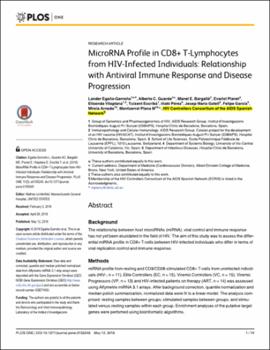MicroRNA Profile in CD8+ T-Lymphocytes from HIV-Infected Individuals: Relationship with Antiviral Immune Response and Disease Progression.
Fecha
2016Resumen
Background
The relationship between host microRNAs (miRNA), viral control and immune response
has not yet been elucidated in the field of HIV. The aim of this study was to assess the differential miRNA profile in CD8+ T-cells between HIV-infected individuals who differ in terms of
viral replication control and immune response.
Methods
miRNA profile from resting and CD3/CD28-stimulated CD8+ T-cells from uninfected individuals (HIV-, n = 11), Elite Controllers (EC, n = 15), Viremic Controllers (VC, n = 15), Viremic
Progressors (VP, n = 13) and HIV-infected patients on therapy (ART, n = 14) was assessed
using Affymetrix miRNA 3.1 arrays. After background correction, quantile normalization and
median polish summarization, normalized data were fit to a linear model. The analysis comprised: resting samples between groups; stimulated samples between groups; and stimulated versus resting samples within each group. Enrichment analyses of the putative target
genes were perfomed using bioinformatic algorithms..
Results
A downregulated miRNA pattern was observed when resting samples from all infected
groups were compared to HIV-. A miRNA downregulation was also observed when stimulated samples from EC, ART and HIV- groups were compared to VP, being hsa-miR-4492
the most downregulated. Although a preferential miRNA downregulation was observed
when stimulated samples were compared to the respective resting samples, VP presented
a differential miRNA expression pattern. In fact, hsa-miR-155 and hsa-miR-181a were
downregulated in VP whereas in the other groups, either an upregulation or no differences
were observed after stimulation, respectively. Overall, functional enrichment analysis
revealed that the predicted target genes were involved in signal transduction pathways,
metabolic regulation, apoptosis, and immune response.
Conclusions
Resting CD8+ T-cells do not exhibit a differential miRNA expression between HIV-infected
individuals but they do differ from non-infected individuals. Moreover, a specific miRNA pattern is present in stimulated CD8+ T-cells from VP which could reflect a detrimental pattern
in terms of CD8+ T-cell immune response.






